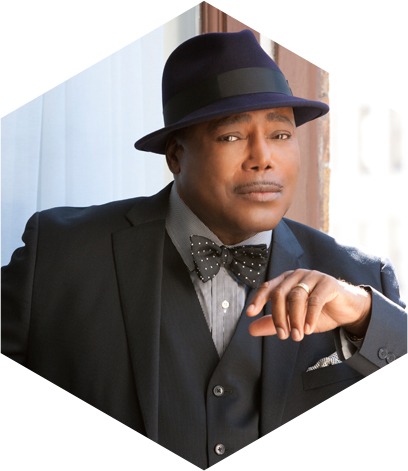
George Benson was born on March 22, 1943, in Pittsburgh, Pennsylvania. He was raised in Pittsburgh’s Hill District and attended the now defunct Connelly High School before dropping out. Benson showed his talent from an early age, winning a singing contest when he was only four years old and enjoying a short career as a child radio performer under the name of “Little Georgie Benson.” He started out professionally as a singer, performing in nightclubs at the age of eight and also learned to dance and play the ukulele at this time. After recording four sides for RCA Victor’s X Records subsidiary in the mid-1950s, his stepfather wanted him to concentrate on developing his instrumental talent and constructed a guitar for him. By his late teens, Benson began to concentrate exclusively on the guitar and formed his own rock band at 17. His interest in jazz came from exposure to records of artists such as guitarists Charlie Christian, Grant Green and Wes Montgomery, and saxophonist Charlie Parker.
Benson began his career working as a guitarist and singer, performing with a succession of rhythm-and-blues and rock bands in the corner pubs of his native Pittsburgh. In the early 1960s, Benson apprenticed with organist “Brother” Jack McDuff, and by the age of 21, recorded his first album as leader. He recorded his debut album in 1964, The New Boss Guitar, with McDuff on organ. After playing and recording with McDuff for four years, Benson set out on his own and moved to New York City, which was then the jazz capital of the world. It was during this early period of his career that Benson would meet his wife of over 40 years, Johnnie, whom he married in 1965. They would have seven children together, all of them sons. While in New York, Benson formed his own band and met two acquaintances that would become major influences in his path to stardom: guitarist Wes Montgomery and Columbia Records producer and executive John Hammond.
It was Montgomery, one of jazz’s most creative guitar players, who came across Benson early, complimenting and encouraging the young guitarist to continue his already impressive work. Montgomery would prove to be Benson’s most important inspiration in the style of playing that he would develop. Hammond was a talent scout who made Benson one of his major discoveries in 1965. He was impressed with Benson’s growing list of sideman credits, which included work with such artists as Herbie Hancock, Freddie Hubbard and Miles Davis. In 1965, Hammond signed Benson to Columbia, for which he would record three albums. His first album, It’s Uptown, featured Lonnie Smith on organ and Ronnie Cuber on baritone sax. This album, along with his second album, Benson Burner, were produced by Hammond and were in the main bop-influenced vein of the jazz of the time. This garnered the young guitarist plenty of positive attention in the jazz community. Benson then followed up his first two albums with The GeorgeBenson Cookbook in 1966, also featuring Lonnie Smith and Ronnie Cuber.
While working on albums with Hammond, Benson also found time to do side projects, one of which was working with Miles Davis in the mid-1960s. Davis employed Benson for his services for his 1967 Columbia release, Miles in the Sky, with Benson playing guitar on the song “Paraphernalia.” However, Benson was searching for wider public recognition, switching labels several times. He landed first with Verve in 1967, recording three albums, and then with A&M in 1968, which included a version of The Beatles’ 1969 album Abbey Road called The Other Side of Abbey Road, released in 1969. Benson was influenced by jazz producer Creed Taylor, who had worked with Montgomery, one of Benson’s mentors. Shortly after the death of Montgomery in June 1968, Taylor began recording Benson with various large ensembles on A&M from 1968-1969 and big groups and all-star combos on the CTI label from 1971-1976. The A&M and CTI albums made Benson a guitar star in the jazz world, but the vocal tracks he cut on the albums reawakened his interest in singing, and this emphasis on vocals would prove to be a vital part of his later successes.
In late 1975, Benson signed with Warner Brothers, yet another label change that would pave the way for his breakthrough into the mass market. Despite his early success, Benson desired to combine his singing and guitar playing. Music producer Tommy LiPuma was able to combine his talents, resulting in Breezin’, the first jazz record to attain platinum sales. This 1976 blockbuster was the first in a long list of albums Benson would record with Warner Brothers. The album included a pop-oriented vocal track, the Leon Russell composition “This Masquerade,” which featured the guitarist scatting along with his guitar solo break. The song reached the number one position on the Jazz and R&B charts, winning a Grammy Award for Record of the Year, and pushed the album to the same position on the pop charts. The album won three Grammy Awards and became the best-selling jazz album of all time.
Breezin’ brought the instrumental title track to jazz radio and was also the introduction of Benson’s trademark: scat singing along with his guitar, doubling it at the interval of an octave. The scat singing provided Benson a special relationship between him and his guitar. “When I pick up the guitar, it’s an extension of what I am,” Benson told Guitar Player magazine. At first, Benson’s singing drew criticism in the studio when he tried to experiment with his new guitar sound. “The first time I tried to sing along with my guitar, everybody in the studio booed,” said Benson. “They all said it wouldn’t work. When I got with Tommy LiPuma all that changed. He said ‘Sure, let’s go with some vocals, see where we get.’ And you know what happened after that.” From this point on, Benson would follow up the success of Breezin’ with a series of commercially successful albums that would mostly emphasize his singing.
Through the late-1970s, Benson continued to record albums for the Warner Brothers and CTI labels. His recordings were becoming more pop-oriented, with more of an emphasis on his singing rather than his guitar playing. Benson began to receive criticism from jazz purists who felt that he had abandoned his early artistry for pop success. “I guess that’s the biggest crime I’ve made as far as jazz lovers go,” offered Benson. “They don’t always like to see you play for the general public. I’ve always tried to let my experience show itself. You learn, you change. The door opened and I walked through it.” Despite this criticism, Benson enjoyed tremendous commercial success, particularly with his 1978 album, Weekend in L.A., which featured the Grammy Award-winning live take of “On Broadway.” The hit album reached number one on the Jazz and R&B charts and also reached number five on the U.S. pop chart.
In 1992, Benson once again played with Jack McDuff, appearing on his album Color Me Blue. He then left Warner Brothers after recording his 1993 album Love Remembers and signed with the jazz-oriented GRP label in 1996, releasing the album That’s Right. That same year, Benson was honored at the 10th anniversary of the Mellon Jazz Festival in Pittsburgh, which also included such jazz greats as saxophonist Joe Lovano, Dizzy Gillespie/Charlie Parker sideman Jimmy Heath, and avant-garde composer John Zorn. In 1998, Benson returned to the studio to record the smooth jazz album Standing Together. His later notable recordings include 2000’s Absolute Benson, 2001’s All Blues, and 2004’s Irreplaceable.
In 2006, Benson teamed up with jazz vocalist and friend Al Jarreau to record Givin’ It Up, which was released in October on Concord Records. Benson and Jarreau were hardly strangers, having both recorded on the Warner Brothers label in the mid-‘70s and performing together at the Ambassador Hotel in Los Angeles. This new pairing came about after Benson had already signed with Concord, at which time Jarreau had begun talks with record executives. “I was talking to Concord, looking at them with big eyes, when one of the execs called me and George into his office and asked, ‘What do you think about doing a record together?’” remembered Jarreau. “We looked at each other and said, ‘Let’s go!’” The multiple-Grammy winners went on tour in America, South Africa, Australia and New Zealand to promote the album before its release. This new collaboration represents “a lot of what George and I typically do – pop and R&B,” within a jazz context, said Jarreau. The record was received well by critics and was nominated for three Grammy Awards, winning two. On June 19, 2007, the Hill District native came home once again, as Benson performed with Jarreau for the Mellon Jazz show at Pittsburgh’s Heinz Hall.
GEORGE BENSON – MARBELLA
Tennis Club Puente Romano Hotel
Date: 21/07/2017
Doors: 20:00hrs
Paul Maxwell: 21:00hrs
GEORGE BENSON: 22:00hrs
call us at 952 88 38 32 for more information



